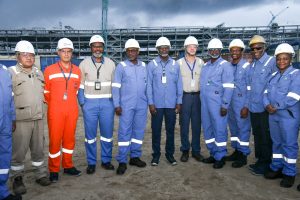Tag: LNG

Private sector steps up efforts to expand Nigeria’s downstream gas infrastructure
Nigeria’s private sector is driving the expansion of the country’s downstream gas infrastructure in partnership with state-owned NNPC Ltd, with companies like Tetracore Energy Group and Axxela recently launching new compressed natural gas (CNG) and liquefied natural gas (LNG) facilities. Tetracore Energy Group has commissioned a new CNG facility in Ogun State, with a capacity of 3.1 million standard cubic feet per day (mmscf/d). The facility will support gas availability along Nigeria’s Western-Southern corridor, where some of the country’s biggest industrial clusters are located. The facility is expandable to 6.2 mmscf/d, providing room for expansion as demand for gas grows. In addition, Tetracore broke ground on a small-scale LNG plant, which will supply gas to industrial and power customers in Nigeria’s Southwest, South-South, Southeast, and Northern markets. “Tetracore is investing approximately $40 million into the future LNG plant where we are breaking ground today, with commissioning expected at the same time next year,” CEO of Tetracore Energy Group, Kunle Williams, said during a grand ceremony in Ogun State on June 7th. Last week, NNPC and Axela commissioned a CNG plant in Lagos, with a capacity to deliver 5.2 mmscf/d of gas per day, serving around 3,700 cars daily and supplying gas to industries and other companies. The partners also announced plans to build six additional CNG service plants to expand access to alternative fuel for cars and industries. Tetracore and Axxela are representative of increased private sector participation within Nigeria’s midstream and downstream gas space. Seplat Energy, one of the country’s leading independent operators, is currently commissioning the 300 MMscf/d ANOH gas plant, while NIPCO Gas and NNPC have agreed last year to invest in the development of several CNG stations across the country,. The private sector’s investment in gas infrastructure is crucial for Nigeria’s energy and industrialization landscape, as it enables the efficient utilization of natural gas for various sectors, including transportation, power generation, and industrial applications. Nigeria is pivoting toward natural gas as an alternative fuel after eliminating a widely used but expensive petrol subsidy, resulting in a sharp increase in pump prices. The government aims to reduce costs and promote clean energy adoption in Africa’s leading oil-exporting nation by transitioning to gas.
Read more »
Nigeria LNG Train 7 hits 52% but concerns remain over future feedstock
The Nigeria Liquefied Natural Gas (NLNG) Train-7 project has reached 52% completion, as Africa’s leading oil producer pushes to boost its gas sector and increase its revenue from gas exports. The multi-billion dollar NLNG Train-7 project is an expansion under construction at the 22.5 mtpa NLNG Terminal in Bonny Island, Rivers State. The project aims to increase capacity by an additional 7.6 mpta of LNG by building a seventh train of 4.2 mtpa capacity and debottlenecking the existing trains. But despite the substantial progress made in constructing Train-7, concerns remain over the future feedstock. These were notably voiced during an engagement session between the Executive Secretary of the Nigerian Content Development and Monitoring Board (NCDMB), Engr. Simbi Kesiye Wabote and Dr. Philip Mshelbila, the Managing Director of NLNG, at the gas company’s operational base at Bonny Island. NLNG management expressed concerns over the delay in initiating deep-water gas projects that are intended to supply feed gas for Train-7 and future expansions. This delay means the facility could be completed without a gas source for liquefaction. Mshelbila said NLNG is already facing difficulties in getting adequate gas supply, resulting in its six plants –Trains 1 to 6 – producing below 50% of their total installed capacity. Data collected by Hawilti shows that the facility was already operating at only 65% last year. While feed gas to the NLNG plants comes mainly from some of its joint ventures (JV) partners, including Shell Petroleum Development Company (SPDC) Limited, Total Energies and Nigerian Agip Oil Company (NAOC), Mshelbila said supplies have suffered disruptions due to recurrent vandalism of pipelines, facility failures and low production from aging wells. According to Mshelbila, NLNG is exploring several options to mitigate the challenge, including partnering with critical security agencies to curtail vandalism on the pipelines and working with their JV partners to increase their gas production. To boost performance of Trains 1 to 6, Mshelbila said the Board of Directors at the NLNG has approved for the company to procure gas from other international and indigenous gas producers.
Read more »